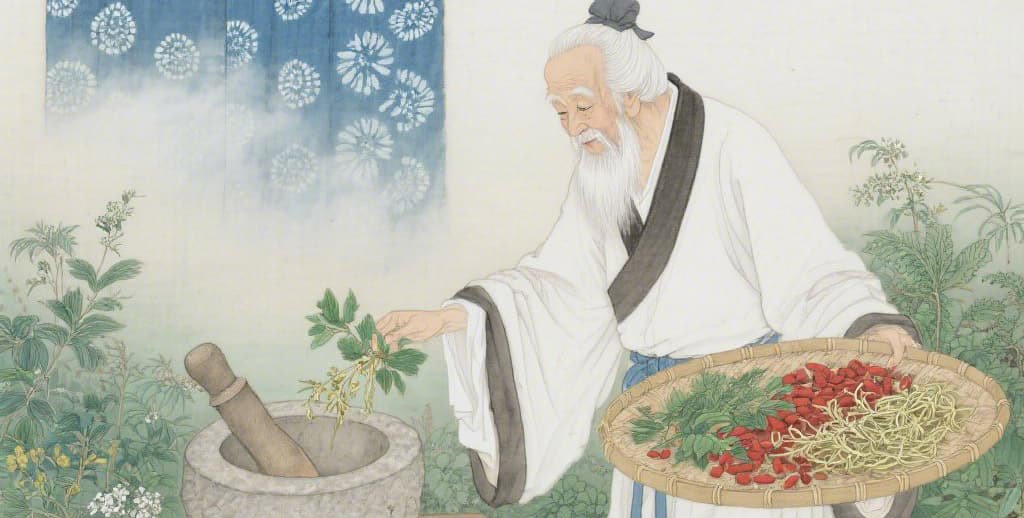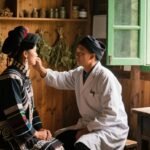Yangdai Jiangkai Ji (Postpartum Fever)
Overview
In Miao medicine, postpartum fever is called Yangdai Jiangkai Ji. It refers to fever after childbirth caused by inadvertent invasion of wind–cold pathogens or other factors.
In Traditional Chinese Medicine, postpartum fever arises during lactation when a mother’s qi and blood are deficient, defensive and nutritive energies are unbalanced, and the body cannot resist pathogens, resulting in persistent fever.
In Western medicine, postpartum fever (puerperal infection) results from decreased immunity, non-sterile delivery procedures, improper uterine incision closure, premature membrane rupture, prolonged labor, or retained tissue, allowing pathogens to invade. Some infections remain latent until postpartum immunity falls, then manifest as fever.
Huhoujipeng · Miao Disease Classification
Yangdai Jiangkai Ji is a major disorder with four subtypes:
Heat-meridian qi-blood deficiency fever
Heat-meridian external pathogen fever
Heat-meridian blood-heat fever
Postpartum low-grade deficiency fever
Aiduojiang · Causes
Improper postpartum care, poor personal hygiene, unfavorable living environment, and overexertion are closely related to its onset.
Gengduomeng · Pathogenesis
Postpartum qi–blood deficiency leaves the vessels empty and the pores loose, so pathogens easily invade the muscle layer, leading to a struggle between upright and pathogenic qi and resulting in fever. In severe heat invasion, pathogens enter the nutritive and blood levels, risking life‐threatening conditions. Emotional distress causes qi stagnation and blood stasis, blocking the Chong and Ren vessels and causing persistent fever.

Diagnostic Key Points
Diagnostic Basis
(1) Persistent high or low fever postpartum.
(2) History of weakness, gynecological issues, excessive bleeding, birth canal injury, non-sterile procedures, exposure to wind–cold or summer heat, or emotional distress.
(3) Exclusion of other gynecological diseases.
Related Exams
Gynecological exam, blood count, culture of secretions or blood, ultrasound, CT, or MRI to assist diagnosis.
Differential Diagnosis
Xiangfa Luokai Ji (Menstrual Fever) also presents with fever but occurs only during menstruation.
Syndrome Differentiation & Treatment
Heat-Meridian Qi-Blood Deficiency Fever
Manifestations: Postpartum chills, persistent high fever, lower abdominal pain, variable lochia with dark, foul discharge, irritability, thirst, scanty yellow urine.
Meridian: Heat meridian, heat disease.
Principle: Clear heat and detoxify (qing re ta du); cool blood and resolve stasis (liang xue hua yu).
Prescription & Explanation:
Jia mang diyu (Dahlia, bao shi lian) 18g
Bangjia qiang (Honeysuckle, jin yin hua) 20g
Wuhui fei (Dandelion, pu gong ying) 20g
Ji gele (Malva verticillata, zi bei tian kui) 20g
Huikana (Violet, zi hua di ding) 20g
Decoction orally.
Heat-Meridian External Pathogen Fever
Manifestations: Postpartum chills and fever, clear nasal discharge, headache, body aches, no sweating.
Meridian: Heat meridian, heat disease.
Principle: Clear heat and detoxify (qing re ta du); nourish yin and reduce fire (zi yin jiang huo).
Prescription & Explanation:
Yizhihuang (Inula, yi zhi huang) 16g
Shidagonglao (Mahonia, shi da gong lao) 15g
Oudi (Perilla leaf, su ye) 12g
Chaohu (Bupleurum, chai hu) 8g
Lianqiao (Forsythia, lian qiao) 12g
Bohe (Mint, bo he) 10g
Decoction orally.
Heat-Meridian Blood-Heat Fever
Manifestations: Alternating chills and fever, scanty or absent lochia, dark blood with clots, lower abdominal pain, dry mouth.
Meridian: Heat meridian, heat disease.
Principle: Invigorate blood and resolve stasis (huo xue hua yu); nourish yin and reduce fire (zi yin jiang huo).
Prescription & Explanation:
Wuyou (Lindera, wu yao) 10g
Xiantao cao (Lysimachia christinae, xian tao cao) 20g
Zijucao (Viola philippica, zi zhu cao) 15g
Jianxu (Sargentodoxa, jian xu) 15g
Decoction orally.
Postpartum Low-Grade Deficiency Fever
Manifestations: Persistent low fever, lingering abdominal pain, variable light lochia, spontaneous sweating, dizziness, palpitations.
Meridian: Cold meridian, cold disease.
Principle: Nourish yin and reduce fire (zi yin jiang huo); tonify qi and blood (bu qi yang xue).
Prescription & Explanation:
Xue renshen (Sanchi, xue ren shen) 20g
Qinghao (Artemisia annua, qing hao) 20g
Digupi (Lycium bark, di gu pi) 15g
Daxueteng (Sargentodoxa, da xue teng) 15g
Decoction orally.
Prevention & Care
Strengthen prenatal care; eat nourishing foods to build constitution.
Treat gynecological issues promptly; avoid intercourse and baths two months before delivery.
Notes
Miao medicine views postpartum fever as arising from qi–blood deficiency, pathogen invasion, or emotional disturbance leading to imbalanced nutritive and defensive qi. Treatment focuses on clearing heat, detoxifying, nourishing deficiency, and soothing the liver.


Leave a Reply